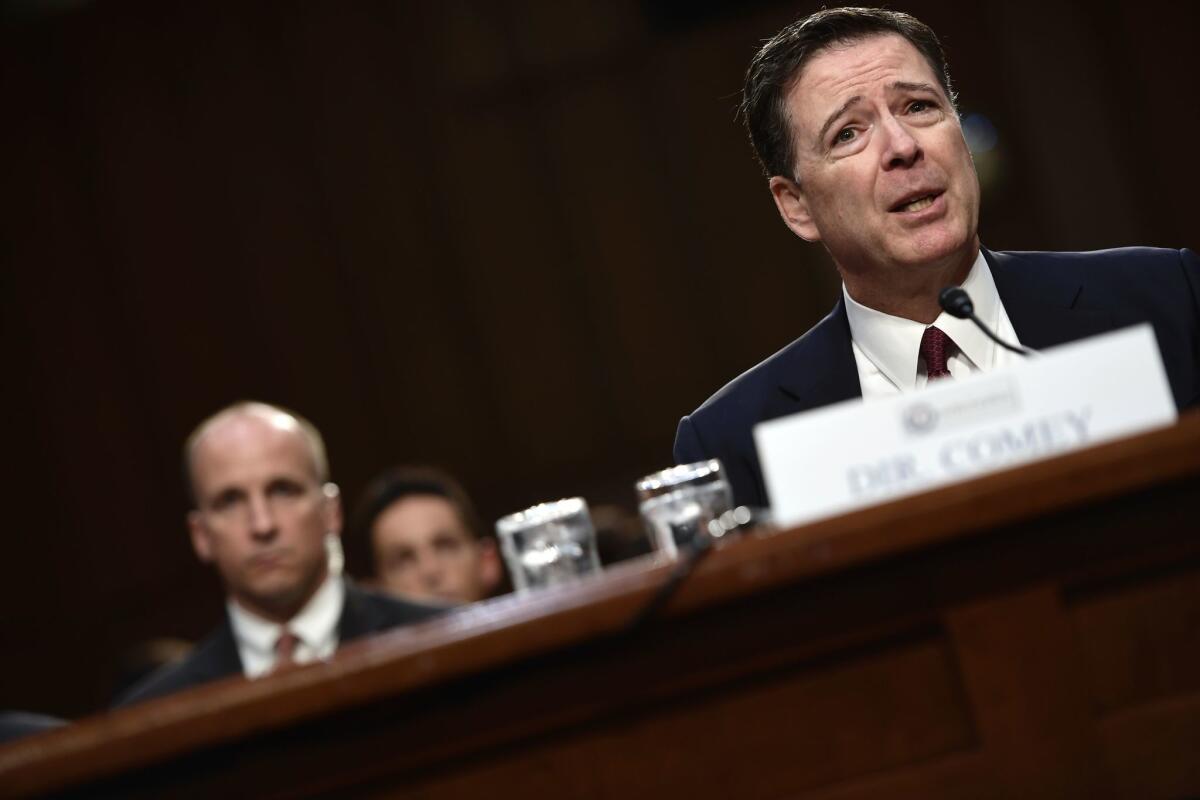Q&A: Did Comey’s release of memos about his Trump meetings violate executive privilege?

In the days leading up to
The president’s lawyer, Marc Kasowitz, raised the same issue after Comey’s testimony, issuing a statement accusing Comey of “unauthorized disclosures to the press of privileged communications.”
Kasowitz was referring to a document that Comey wrote memorializing a meeting with Trump that Comey then passed along to the press through a friend.
“We will leave it [to] the appropriate authorities” to determine whether the leaks “should be investigated along with all those others being investigated,” he wrote.
The discussion renewed long-standing questions about the legal privileges that may be invoked by the president and his advisors.
Does the president have an “executive privilege”?
Yes. It is not written in the Constitution or federal law, but Congress and the courts have assumed that the president, who heads the executive branch of the government, has a right and a privilege to maintain some privacy as he goes about his work. Just as the president could not tell the Supreme Court justices to tell him what was discussed in one of their private conferences, judges and senators cannot tell the president he must disclose what he discussed in the Oval Office.
But these unwritten privileges are understandings, not hard-and-fast rules of law. In the most famous case of executive privilege, President Nixon invoked this doctrine in 1974 to shield from disclosure the tape recordings of his conversations in the Oval Office. And while the Supreme Court acknowledged there is such a thing as executive privilege, the justices ruled unanimously that Nixon had to turn over the Watergate tapes to the special prosecutor because they were needed as evidence in a criminal case. The president did as directed, and a few days later, he resigned.
Could the White House invoke a “presidential communications privilege” to prevent the president’s aides from testifying in Congress?
Probably yes, say former White House lawyers. They say that during Bush and Obama administrations, the White House objected on occasion when congressional committees insisted on hearing testimony from an executive branch official. But these concerns were usually worked out by narrowing the subjects to be discussed.
Did Comey violate executive privilege by testifying in the Senate and disclosing his conversations with the president?
No, according to experts on executive privilege, in part because Comey is no longer an administration official. Moreover, the president may have waived any privilege by also publicly discussing his contacts with Comey.
“Executive privilege does not apply to a private citizen who is called to testify before the Senate,” said Mark J. Rozell, dean of the school of policy and government at
Typically, legal privileges are invoked by people who have evidence or documents that someone else is seeking. By invoking their privilege, they are saying they are refusing to turn over the material. But in this instance, Comey was a private citizen who was willing to speak to the Senate. “There is no legal prohibition on him, as a private citizen, discussing his conversations with the president,” Rozell said, so long as he was not revealing information that was classified as secret.
And Comey said Thursday that he intentionally ensured that nothing in his memos about the Trump meetings contained anything that could be considered classified material
So did Comey violate any law or privilege by releasing the memo recounting his conversations with Trump?
Probably not. Several lawyers said he was free to reveal the information. But some were troubled by Comey disclosing the actual memo.
“These were unclassified notes made by Comey himself. I know of no legal bar to his releasing them to the press,” said Walter Dellinger, a former White House lawyer under President Clinton.
Lawyers pointed to the dozens of books written in which former White House aides described their times working with the president, including details about their confidential conversations. The 1st Amendment and its protection for the freedom of speech would probably stand in the way of any effort to block such a book, assuming it did not reveal classified information.
But some lawyers said government employees are prohibited from taking documents from their agencies and releasing them to the public. They said Comey may have left himself open to criticism if he released to the press the memos he wrote while employed at the FBI.
ALSO
Key moments from Comey's testimony: Lies, leaks, hopes and tapes
Bad news for President Trump: Republicans aren't rushing to his defense
Sign up for Essential California
The most important California stories and recommendations in your inbox every morning.
You may occasionally receive promotional content from the Los Angeles Times.








